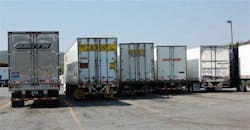Truck tonnage falls again, adding to uncertain economic outlook
By Neil Abt and John Hitch, Fleet Owner
Truck tonnage declined in November from October, the third drop in the past four months. The monthly report from American Trucking Associations provided fresh evidence the freight market was losing steam as the year wound down, leaving analysts mixed on what to expect in 2020.
ATA said the advanced seasonally adjusted for-hire index stood at 113.5 in November, down 0.7% from the previous month and 7.2% below July. This index covers mainly contract freight.
“November was the first month to see a year-over-year drop in the index since April 2017,” said Bob Costello, ATA’s chief economist. “While disappointing, it fits with the expected soft gross domestic product reading expected in the fourth quarter and reports of a soft fall freight season.”
The not seasonally adjusted index, which represents the change in tonnage actually hauled before any seasonal adjustment, was 115 in November, 7.9% below the October level. The difficult environment led Knight-Swift Transportation Holdings on Dec. 19 to lower its quarterly earnings guidance, citing an overcapacity of trucks during the holiday quarter.
“We believe capacity rationalization is underway as evidenced by trucking business failures, Class 8 new truck orders below the replenishment rate, further weakening of Class 8 used tractor values, and contraction in trucking employment,” the truckload carrier said in a statement. “We expect the rate of capacity rationalization to accelerate with additional factors that include the mild freight seasonality that is typical with first quarters, significant insurance cost inflation, and the new regulatory introduction of the CDL drug and alcohol clearinghouse.”
A report from Morgan Stanley echoed these comments, saying a range of regulatory and legislative factors should lead to higher trucking rates. However, there are reasons for concern entering 2020.
ACT Research said in a December report “the prosperity of the year we are leaving will transition to tougher medium- and heavy-duty market conditions in 2020.”
Kenny Vieth, ACT’s president and senior analyst, said that after peak sales in 2019, “significant declines are ahead in 2020, as sales and build will follow trends in net orders and backlog volumes lower in their respective markets."
Likewise, Don Ake, FTR Transportation Intelligence’s vice president of commercial vehicles, suggested Class 8 order numbers for October and November “signal possible trouble.”
While he does not expect a recession, “the conditions are similar to 2016 when economic growth nearly stalled out. It would not take much of a bigger dip or an outside force to push the economy under water for a short period.”
After several years of investing profits into newer, modern equipment, it feels inevitable that a “market correction is something we’re going to be dealing with,” said Tim Kraus, president and chief operating officer of the Heavy Duty Manufacturers Association.
Steve Graham, a partner with FTR, said the U.S. economy has “clearly downshifted to a 2% growth rate.” He wrote in the company’s December newsletter there is a higher level of uncertainty entering an election year – and because of ongoing trade negotiations.
“The new year will present changes and challenges,” Graham said. “If all goes well, we can expect the economy to grow 2% and maybe accelerate at the end of the year. If trade tensions accelerate, the economy may slip into recession.”
Graham wrote this prior to the U.S. House approving the new USMCA trade deal. The Senate is expected to vote on the legislation, a replacement for the North American Free Trade Agreement (NAFTA), in early 2020.
Donald Broughton, principal and managing partner of Broughton Capital LLC, said during a webinar hosted by PrePass that settlements of various lingering trade disputes “could create a wave of activity.”
For any freight transportation executives with growing concerns about the economic conditions, John Blodgett, a vice president with MacKay and Co., has some advice.
“You just have to keep your head up a little bit more and pay attention,” he said. “You don’t want to spend too much time thinking about things you can't change. You don't want to get away from your day-to-day business.”
He also noted that for the trucking aftermarket, it is a positive sign when the average age of equipment is dropping. That means more trucks to age over time and more need for parts and service.
